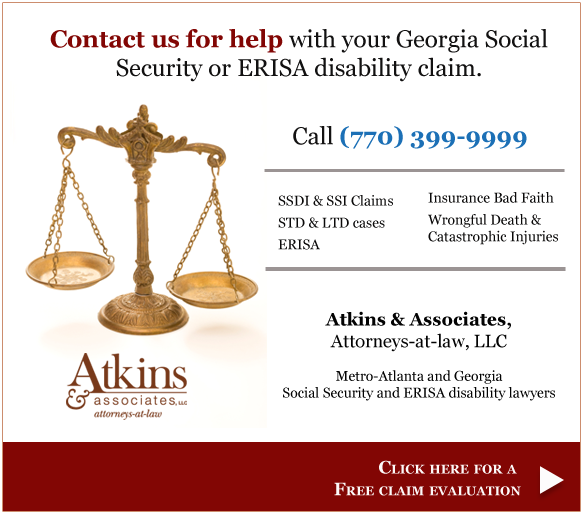Reasons Why You Should Apply for Disability Benefits:
1. You Earned It!
You worked hard and you are entitled to draw benefits when you are disabled.
- If you purchaseda private disability income policy, you paid premiums each month to gain income protection and draw benefits in the event of sickness or injury.
- If you worked for an employer, your participation in any STD or LTD plans was earned as part of the compensation for your hard work.
- If you paid into Social Security you earned the right to withdraw your money early before retirement for disability.
- If you served in the US Military, your honorable efforts for your country earned you protection in the event of disability.
2. Protect Your Income and Your Family!
- Entitlement to disability insurance benefits typically provides monthly benefits in the event of total or partial/residual disability after a specified waiting period and in some cases future cost of living increases. Short term disability generally protects between 80-100% of your monthly employment income in the short term. Entitlement to LTD benefits generally provides about 60% of your monthly employment income in the long term, typically to normal retirement age. Private Disability Income Policies provide benefits at the face amount plus benefit or cost of living increases for the policy period which is often for life.
- Entitlement to Social Security disability allows you to receive monthly disability benefit checks for you and your family depending upon the amount paid into the system.Family benefits are generally one-half of primary benefits. In most cases, you will also receive a lump sum payment for back benefits.
- VA Disability provides a pension based on the percentage of the impairment and an additional benefit in the event of unemployability.
- Entitlement to disability under a waiver of premium policy coverage on your life insurance or mortgage or credit disability policies helps you maintain valuable coverage to protect your family if you should die or become unable to pay your mortgage orbills. These benefits are often too valuable to let lapse when they become difficult to afford during times you are unable to work.
3. Protect Your Other Benefits!
Often entitlement to disability benefits will also protect or extend your entitlement to other benefits such as medical insurance, dental insurance, life insurance, pensions, and service year credits.
- Disability entitlement under many STD and LTD Plans extends coverage for other important employee benefits including medical, dental, vision and life insurance coverage, pension and service credits. Occasionally such plans use SSDI entitlement as a standard.
- Disability entitlement under some employer policies allows for extended medical leaves of absence beyond the 12 weeks of FMLA.
- Disability entitlement to Social Security Disability Insurance (Title II) benefits allows you to become eligible for Medicare after 24 months.
- Disability entitlement to Supplement Security Income (Title XVI) benefits allows you to become eligible for Medicaid when you have low income and resources.
- Entitlement to Social Security disability benefits within your period of coverage under a COBRA insurance plan will extend your 18 month COBRA entitlement an additional 11 months.
- Entitlement to a period of disability from Social Security protects your Social Security Retirement and Survivor’s benefits. Any year within a period of approved disability will be excluded when your retirement benefit payment is calculated.
4. Protect Your Return to Work Assistance!
- Many LTD policies have return to work incentives or rehabilitation clauses to assist in a work recovery. Some of these provisions allow for payment of a full or partial benefit during a return to work attempt or assistance with rehabilitation or retraining. Social Security allows a trial work period during which one can attempt to return to work and receive disability benefits as well. If you are not successful in your attempt to work, your Social Security benefits may not be interrupted.
5. Maximize Your Protection and Recovery!
- Entitlement concurrently under various disability programs generally increases your overall recovery even though there may be coordination of certain benefits, offsets, and varying tax consequences. Even if you are already getting Workers’ Compensation or VA Disability Benefits or Long-Term Disability or Social Security Disability benefits your total present income may increase and you may be entitled to a large amount of back benefits.
- Most LTD policies require you to apply for Social Security Disability Benefits and will pay your attorney fees
- Offsets may not apply in certain cases. For instance, if you were a high wage earner, your SSDI benefit may not be offset at all by the amount of your Workers’ Compensation. Even though many group LTD policies offset other disability benefits, most policies do not offset Social Security’s cost of living increases. In addition, some policies only offset your individual benefits and not your family’s, and many policies have a minimum benefit payment that is not offset.
- Entitlement to disability under one program may assist in proving or maintaining entitlement in another program. A finding of disability from SSA can help classify your Workers’ Compensation claim as catastrophic, can help prove your entitlement to VA benefits, and can help support your on-going entitlement to LTD benefits, particularly if your policy contains a change in definition to any occupation after benefits have been paid for a specified time. In addition, many LTD policies limit benefits to 24 months or less, if mental illness causes or contributes to your disability; Social Security does not distinguish between mental and physical limitations, and thus can provide additional protection.
- Note: Concurrent claims need to be carefully prepared to avoid unintended negative consequences including the tax consequences of concurrent entitlements and offsets. Tax implications should be discussed with a professional CPA. Social Security payments may be tax free depending on your other income. LTD benefits are taxable only to the extent you did not pay the premiums for the insurance. If you paid 100% of the premiums with after tax dollars then the benefits are 100% tax fee.






























